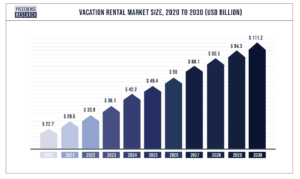Over the past years, the vacation rental industry has evolved from niche “alternative” accommodations to a mainstream sector. The growth has been propelled by dedicated sites like HomeAway (now Vrbo) and Airbnb, adoption by massive OTAs like Expedia and Booking.com, and changing traveler priorities during the pandemic.

Today, our sector is booming, as more leisure and business travelers opt for the safety, convenience, and value of private rentals. Globally, the vacation rental market is expected to reach over US$111.2 billion in revenue by 2030, growing at a compound annual growth rate (CAGR) of 17.3% from 2021 to 2030, according to Precedence Research.
To understand where the industry is heading, we need look no further than the hotel industry. Over the past decades, the hotel industry has transformed from a highly fragmented marketplace of independent properties and small hotel groups to the massive consolidation we see today, with megabrands like Marriott and Hilton now dominating the market. At the same time, online travel agencies have consolidated under a virtual duopoly of Expedia Group and Booking Holdings, which represented 92% of the OTA market in the US in 2019, according to Phocuswright.
Whether the vacation rental industry will follow a similar path is difficult to say, but the distribution landscape has most certainly evolved, and a change in mindset is needed. Only by letting go of misperceptions about the industry can property managers hope to adapt and thrive. And it starts with busting the myths of vacation rental distribution.
Myth #1: Your only real competitors are other vacation rentals
Part of what’s driving the growth is increased supply as more players get into the vacation rental business, from independent property owners to global hotel companies like Marriott and Hilton. As a result, competition has never been fiercer.

Today, when travelers search for accommodation in a destination, whether on Google, Expedia, or Airbnb, they’re presented with an unprecedented array of options. Vacation rental listings appear head-to-head in competition with hotels, resorts, B&Bs, serviced apartments, and all types of private rentals. If you aren’t listed on these platforms and don’t stand out from the others, you’re missing out on valuable business.
Myth #2: A vacation rental website is all you need
Your website is your most important marketing tool and the central hub for capturing direct bookings, but in today’s fragmented marketplace it’s just the beginning. To thrive, every property management company needs a diverse distribution strategy. This means listing your properties on a range of booking channels to maximize reach. At the top of the list are major channels like Expedia, Booking.com, Airbnb, and their affiliates.
Myth #3: Listing on the top distribution channels is enough
There are also dozens of regional and specialty channels that target niche segments of travelers and capture them at different stages of traveler journey. This includes regional OTAs like Agoda in Singapore, Wotif in Australia, and FeWo-direkt in Germany, vacation rental sites like FlipKey and HolidayLettings, and business travel platforms like Egencia and American Express Travel. It also includes private members-only vacation exchange networks like Wyndham’s RCI and Alliance Reservations Network (ARN).
These sites provide property managers with access to travel markets you could never hope to reach on your own. When planning a trip, travelers often visit multiple sites to compare accommodation offerings. The increased exposure on these sites builds awareness and lends credibility as well as driving bookings.
Myth #4: Your customers prefer to book directly
While attracting direct bookings must always be the priority, the reality is many travelers prefer the convenience, array of choices, and confidence of booking on the OTAs they know and trust. They also want the reassurance they’re getting the best deal. OTAs spend billions of dollars each year to advertise those assurances, and it’s highly effective. In 2021, they accounted for 52% of the hotel online market in the US.
Even large hotel brands that pour millions of dollars into marketing find it tough to compete, with up to half of online bookings coming from OTAs. Rather than try to beat OTAs at their own game, property managers should accept them as an inevitable and desirable part of their business mix and start making the most of the opportunities.
Myth #5: You can’t afford to pay OTAs commissions
Conventional wisdom says that direct bookings are more lucrative than third-party bookings because you avoid paying hefty OTA commissions. But the costs of attracting direct business, including website maintenance, advertising, customer service, and payment collections, can easily equal or even exceed the costs of commissions.
Consider these commissions as the price you pay to attract more bookings; the incremental revenue should easily justify the costs. It’s also about leveraging demand to drive higher average rates and greater profitability. Moreover, you pay commissions only when bookings are realized and can increase rates to cover the costs.
There’s also the Billboard Effect to consider, which says that travelers often discover hotels on OTAs and then book directly with the property. The same effect is undoubtedly true of vacation rentals. So the real question is can you afford not to be listed on OTAs?
Myth #6: Managing multiple distribution channels isn’t worth the time
This is a valid concern, especially in this time of labor shortages, but that’s where channel management technology comes in. With a channel manager, property managers can manage rates, inventory, and listings on multiple channels from one centralized platform. This not only saves you time but also prevents lost sales and double bookings. When you list on Expedia and Booking.com, you’re automatically listed on their affiliates too. After that, adding additional channels is easy.

Myth #7: Once you’re listed on OTAs, the bookings will pour in
Vacation rentals are a complex product to sell. It’s not enough to have your products on the shelf. They need to stand out from others, and you need to provide directions for usage and be available to answer customers’ questions throughout the purchase cycle. This requires active management of listing content and quality, participation in promotions, and 24/7 customer service.
Myth #8: Revenue management doesn’t apply to vacation rentals
Today, virtually every industry that sells perishable products practices revenue management, regularly adjusting pricing and purchase restrictions to reflect changes in market demand. Hoteliers learned long ago that even minor adjustments to pricing can have a major impact on the bottom line. Consumers now expect to pay premiums in times of high demand and for conveniences like flexible cancellation. If you’re not practicing revenue management, you’re leaving money on the table.
Myth #9: All vacation rental channel managers are the same
In fact, there are significant differences among software providers. When shopping around, look for a provider that not only offers state-of-the-art technology and seamless connections to major distribution channels but also offers 24/7 support with listing optimization, customer service, payments, marketing, and promotions.
As the vacation rental industry grows and matures, it’s the property managers who accept the realities of the business who will come out on top. This means maintaining a diverse distribution strategy and investing in best-in-class technology and services to maximize your exposure, build trust, and drive more bookings.
